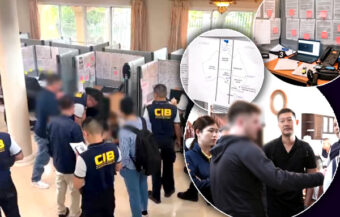A court in 2019 ruled that teachers should get at least 30% of their salary paid to them for living expenses. This was the call from Move Forward this week even as it welcomed a cabinet move to pay civil servants on a fortnightly basis. Economic Team Head Sirikanya Tansakul said that the priority for the government should be relief for civil servants from crippling debt obligations.
A top industry leader has come out to welcome a decision by the Thai cabinet this week to split monthly salary payments for civil servants into a fortnightly payday. Kriengkrai Thiennukul of the Federation of Thai Industries (FTI) suggested that the move to speed up payments of government salaries together with the controversial ฿10,000 Digital Wallet payment from February 1st 2024 to all Thai citizens over 16 years of age may give a boost to the economy early next year. However, he warned the government that it is thinking too much in the short term and not enough about the kingdom’s medium and long-term economic prospects while Move Forward’s Finance spokesperson Sirikanya Tansakul also welcomed the plan but urged the government instead, to prioritise cutting debt repayment obligations faced by civil servants, from teachers to policemen, as a key priority. Ms Sirikanya highlighted tackling household debt as the country’s most pressing issue.
The Thai cabinet this week agreed to implement a scheme to split government salary payments to civil servants, teachers and members of the armed forces, into two payments.
This will come into effect on the 1st of January 2024 and will see government employees paid earlier in the middle of January and the end of the month.
Government moves forward on new Constitution plan and also cuts electricity charges from September but oil prices are moving in the wrong direction
The Cabinet, at the same time, agreed on several measures including the establishment of a Referendum Study Committee to be chaired by the Minister of Commerce and Deputy Prime Minister Mr Phumtham Wechayachai in a move designed to begin the process of rewriting the 2017 Constitution.

The cabinet also agreed that from September 1st, the cost per kilowatt hour of electricity will fall from ฿4.45 to ฿4.10 brought about by lower energy costs and an end to elevated repayments to the Electricity Generating Authority of Thailand (EGAT) which were necessitated by concessions made by the agency to the government during the pandemic crisis.
There are fears however that with rising oil prices on international markets, such concessions may not be as easy to deliver going forward although the Pheu Thai policy platform calls for lower electricity costs even if this means subsidised energy using public funds.
Pheu Thai-led government shows its teeth at foreigners in Thailand with a tightening of the income tax code which could have ramifications
The shift towards higher borrowing and taxation could be seen this week after Prime Minister Srettha Thavisin announced moves to tighten the tax regime on income tax paid by foreign residents in Thailand while he also appeared to disagree publicly with Bank of Thailand Governor Sethaput Suthiwartnarueput.
Mr Srettha apologised for the income tax move but emphasised the need to tackle income inequality in Thailand and raise funds for government stimulus measures going forward.
Bank of Thailand boss appears critical of the new government’s policy initiatives on the economy
Srettha eyes top job and defends ฿10k spending wallet for over 16s just unveiled as a Pheu Thai policy
Questioned about this while in New York on Wednesday the Prime Minister told reporters that he has no plans to dismiss the central bank governor after Mr Sethaput appeared to criticise the ฿10,000 Digital Wallet giveaway scheme.
‘It’s very funny. I have never had such an idea and I am not sure how such news came out,’ Mr Srettha explained. ‘I have met the central bank governor three times since I entered politics. Before I assumed the prime minister’s post, the governor visited the PheuThai Party headquarters to discuss the digital wallet policy. He gave suggestions and I took them for use. I later met him at the Finance Ministry on the day our policy was delivered. Some people said the prime minister has no right to dismiss the Bank of Thailand governor. I myself have never had any thought of doing so. We hold no grudges against each other. I respect and treat him with honour. We respect each other.’
Fortnightly salary payment plan drew a mixed response but, by and large, was welcomed by industry and the opposition Move Forward Party as a boost
The proposal agreed by the cabinet this week to split the payment of government salaries from a monthly to fortnightly basis has understandably met with mixed reaction with anonymous sources within the civil service warning of the danger that some government employees may use the more flexible payment of salaries to incur further debt while business leaders have accepted that the move will mean higher borrowing by the government in the short term and more money being dispersed into the economy creating a short term boost to GDP.
The Finance spokesman for the Move Forward Party, Ms Sirikanya Tansakul, has provisionally come out in support of the proposed move and highlighted the need for the government to study how a new payment regime would be introduced.
Ms Sirikanya, the Head of the Move Forward Economic Team, however, suggested if the government wishes to provide more money in the pockets of those working for it, it should move to cut down the level of debt repayments associated with loan co-operatives and other commitments which in many cases see government employees taking home sometimes less than 10% of their pay packet.
Urgent priority says Move Forward head must be to cut debt repayment obligations by civil service employees who are being strangled by revolving debt
She explained the position in her own words: ‘Every government official knows this. There is a problem with debt write-offs that causes less than 10% of the salary envelope to remain for many people. Some people with salaries of ฿60,000 to ฿70,000 have less than ฿1,000 left in their envelope. This matter has been talked about for many years but I want the front of the envelope to be cut to at least 30%. Even though the issue of household debt has been on the agenda for many years, we have still not been successful. I want to inform the government that if you want to increase liquidity for civil servants, providing two monthly payments like this won’t really work. I think the government should resolve to cut debt repayments for government officials so that the minimum amount in any pay envelope is 30% which is something that would be of far greater benefit to government officials and provide a greater boost to the economy.’
In a recent commentary from the Bank of Thailand on the country’s chronic household debt problem, the issue of resolving personal loans or facilities for middle-class borrowers, which are not being repaid, was identified as one of the key concerns within the current financial system.
This would be in addition to borrowing co-operatives operated by agencies aligned with government employers such as the Ministry of Education and the Royal Thai Police.
Focus of this plan is on unsecured personal debt to middle-class borrowers such as credit card debt and continuously revolving personal loans
Ms Sirikanya particularly mentioned saving cooperatives. This was raised in Parliament this week by her Move Forward colleague Ms Phakamon Noonanan MP, who urged the new Minister for Education, Police General Permpoon Chidchob, to look closely at the working conditions for teachers in the education system.
MP in parliament highlights the plight of teachers
Ms Phakamon criticised remarks made in Parliament that teachers should be more adept at practising self-sufficiency.
The Move Forward MP suggested that the welfare of teachers has to be looked at in terms of their pay and the working hours involved in the job.
Indebted teachers thrown a lifeline as a Bangkok court rules they must have 30% of their salary
The problems with indebted teachers are synonymous with the country’s rising household debt problem with teachers who are declared bankrupt also losing their jobs and careers if a court hands down such a judgement automatically as is the case for all civil servants, hence the pressing nature of the country’s chronic personal debt issue.
The proposal to pay salaries on a fortnightly basis was welcomed by the Chairman of the Federation of Thai Industries (FTI), Mr Kriengkrai Thiennukul, who said it would certainly help to stimulate the economy as money would be applied faster.
Industry chief welcomes the move and economic stimulus but warns that medium-term and long-term economic challenges must be tackled
Mr Kriengkrai accepted that this would involve more public debt and also that it would require planning to ensure provision was made for payments that are due from teachers, or from public sector workers such as utility charges and loan repayments.
He felt that the matter could be worked out and a solution found.
‘Normally, civil servant salaries come out at the beginning of the month. They spend a lot of money on expenses at the beginning of the month. If the salary is paid out now twice a month, I understand the government’s intention is that the proposal would speed up payments to teachers, and to workers with the twice-a-month payment regime. It will impact debt repayments to banks and other loan providers. Therefore the details of the initiative must be looked at and discussed in order to find a solution,’ he declared.
The industry leader said that the move, scheduled for January next, together with the ฿10,000 digital wallet giveaway in February, could give a short-term boost to the economy, but cautioned that efforts must be made also to drive the economy in the medium and long term, with the danger of a slowdown in the middle of 2024 anticipated.
Mr Kriengkrai also called for care to be taken in the implementation of the digital wallet proposal relating to the use of digital money and blockchain technology.
Join the Thai News forum, follow Thai Examiner on Facebook here
Receive all our stories as they come out on Telegram here
Follow Thai Examiner here
Further reading:
Concerns over household debt rising as banks report marginally lower non-performing loans
Thailand preparing for a soft landing as ‘cracks’ open up in the Chinese economy says bank chief
Economic danger signals emerging as politicians wrangle over who will form the next government
Bank of Thailand to tackle household debt in new plan from 2024 which will see higher standards
Politicians skating on thin ice as the economy may not be able to withstand a political stalemate
Debt crisis may be one of the top items on the new cabinet’s agenda as central bank stands ready
Potential hazard lights flashing as kingdom’s auto loans spiral into default with sky-high borrowing
Bank of Thailand governor gives veiled warning to voters on the danger posed by populist policies
Financial markets debt sell-off sending a signal to Thailand before the May 14th General Election
PM warns giveaway policies of some parties may be ‘bad karma’ for the country in the longer run
Economic recovery shaky despite strong foreign tourism as global economic outlook deteriorates
Recession fears rise as growth projections are cut and export output continues to decline in 2023
Economy faces export clogs with rules in China and ‘green imperialism’ from European Union
Vital European Union free trade deal with Thailand with stiff demands from Brussels to take time
Thailand’s financials are sound but the economy is exposed if another world banking crisis emerges
Thai economic woes grow with a 10-year high trade deficit as January exports slumped by 4.5%
Credit crunch as firms seek more bank loans with tightened lending criteria and recession fears
Even as the baht surges, Thailand faces economic recession in mid-2023 with lower earnings


















